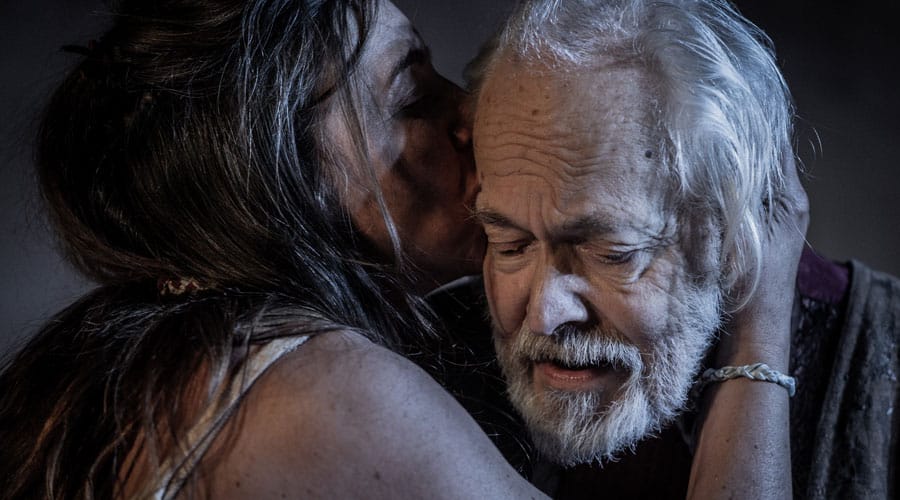MIRANDA Sweet lord, you play me false.
FERDINAND No, my dearest love,
I would not for the world.
MIRANDA Yes, for a score of kingdoms you should wrangle,
And I would call it fair play.
ALONSO If this prove
A vision of the island, one dear son
Shall I twice lose.
SEBASTIAN A most high miracle!
FERDINAND [Sees Alonso and the others.]
Though the seas threaten, they are merciful.
I have cursed them without cause. [He kneels.]
ALONSO Now all the blessings
Of a glad father compass thee about!
Arise and say how thou cam’st here.
MIRANDA O wonder!
How many goodly creatures are there here!
How beauteous mankind is! O brave new world
That has such people in’t.
PROSPERO ’Tis new to thee. (5.1.172-184)
I don’t think that Miranda’s accusation that Ferdinand is cheating at chess, playing her false, is meant at all seriously: she can accuse him of falsehood because she is already so certain of him, as a chess player and as a partner. Their playfulness is innocent, but not naïve, and Miranda’s besotted conclusion is to tell him that he could do whatever he wanted, even cheat, and she would call it fair play. Alonso the king is full of hope, but fearful of renewed agony and grief: if this is not Ferdinand his son, but merely a vision of the island (and they’ve certainly seen enough of those) then it will be like losing his dear son all over again. (And it’s Sebastian who—ingratiatingly? or demonstrating that he’s a reformed character?—supplies the other reaction: A most high miracle! Sebastian is, of course, Ferdinand’s uncle, who was prepared to murder Alonso, his own brother, on the assumption that Ferdinand was drowned and he was thus next in line for the throne of Naples…) It matters that Ferdinand is as overwhelmed to see Alonso as the King was to see his son: the sea which he has cursed has delivered his father back to him, and he kneels, the faithful, loving son, and asks his father’s blessing—which his father gives him, gladly, and in saying that his blessings compass his son about, there’s a suggestion that he embraces him, enclosing his son in his arms as he has compassed, surrounded him with blessings. How did you get here? he asks. But no answers as to that, yet, either.
But then Miranda, in her last, beautiful lines in the play. O wonder! (herself the wonder, but also the one who wonders, and who wonders at). She is not afraid, or overcome with nerves, but radically, radiantly open to the new: How many goodly creatures are there here! Strangers, yes, but met with optimism and curiosity. How beauteous mankind is! (It can get a laugh, if it’s played with too much frank enthusiasm—more men!—but try not to cheapen it.) O brave new world that has such people in’t. This is a moment of new creation, new beginnings, and new life, and Miranda’s response is god-like; she sees that it is good. This brave new world is not yet an ironised, undercut dystopia, and Prospero’s response doesn’t have to be the voice of bitter experience, or world-weariness, or even amused tolerance. It is new to her, beauteous and goodly and full of wonder and, messed up, damaged, anxious, control freak that he is, at this moment Prospero can see it through her eyes.
After all, Prospero is a teacher. And for those of us who teach, the experience of teaching is very often one of seeing the most familiar things, the oldest stories, made new through the eyes of our students, finding once again, through their fresh engagement, the things that we perhaps hadn’t even realised that we’d lost.



